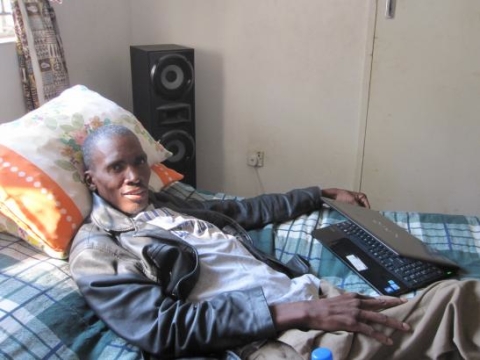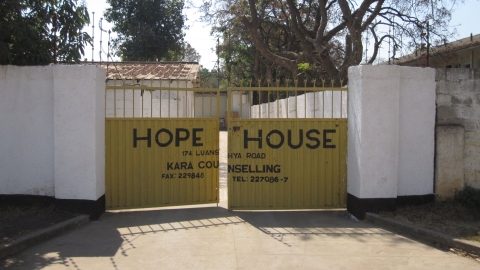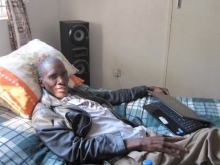
Winston, shown here, shaped Africa’s response to AIDS in many ways, from startling Zambia in 1992 as the first person to say publicly he was HIV-positive to 20 years of protest, critique, deadly mistakes and fresh thinking. (Photo by Antigone Barton)

Photo of Winstone Zulu, taken recently at Hope House, Kara Counselling, in Lusaka, where he died, in the same room where he lived for a while, 20 years ago, when he went public about being HIV-positive. (Photo by Antigone Barton)

Winston, shown here, shaped Africa’s response to AIDS in many ways, from startling Zambia in 1992 as the first person to say publicly he was HIV-positive to 20 years of protest, critique, deadly mistakes and fresh thinking. (Photo by Antigone Barton)
It is the early 1990s and I am in Zambia doing a story on drought. Winstone has just come out as the first Zambian to admit publicly he is HIV+, at a time when AIDS is like leprosy and could expel you out of communal life. I meet this young man with a polio limp, a big smile, a sense of humor and a sense of urgency: He and many more are going to die for lack of treatment and compassion. He’s got to fight, for himself and for all the brothers and sisters.
It is the late 1990s and I am writing portraits of people with HIV. Winstone tells me how he and his wife Vivian timed conception when their viral load was low and used nevirapine and formula milk to ensure their babies would be HIV-free. These are the days before mass ARVs, so I am surprised but, hey, this is Winstone, and I have learned he will rattle any conventional wisdom in my head.
It is 2005 and I am in Zambia doing a study for UNAIDS on networks of HIV-positive people. (The study turned out to be so politically incorrect that it was never published, and Winstone was, as usual, a refreshingly frank source.) Winstone invites me to Kabwe, where he has just moved to work with orphans.
Winstone tells me that in 2000 he let Thabo Mbeki and the AIDS dissidents convince him that ARVs were poison. Winstone quit ARVs and nearly died. He was fooled, he was a fool. Back on treatment, he recovered and wrote an angry, eloquent letter to Thabo Mbeki, holding him responsible for the deaths and sickness of many Africans who heeded Mbeki’s idiotic stance, although, typically, Winstone assumed responsibility for his decision to quit ARVs.

Winston, shown here, shaped Africa’s response to AIDS in many ways, from startling Zambia in 1992 as the first person to say publicly he was HIV-positive to 20 years of protest, critique, deadly mistakes and fresh thinking. (Photo by Antigone Barton)
You could always count on Winstone showing you something different, be it forgotten landmarks in a forgotten town, or ideas about AIDS that turned your own ideas around. I owe Winstone a lot of fresh insights on how the AIDS epidemic plays in Africa.
He was under no illusions – about greed, corruption, complacency and hypocrisy among politicians, donors and fellow activists – but he kept alive his dream: that treatment is a right of Africans, of the disabled, gays and sex workers. That TB is as bad as HIV and deserves as much attention and resources. That discrimination does not have a place under the African sky.
As I write this, the sun sets over the Maputo skyline. I live in Mozambique, where very few university-educated people have had Winstone’s courage to say openly “I am HIV+,” where acknowledging you are positive is still the province and the mandate of the poor.
As I write this, tears welling in my eyes, Bob Dylan’s raspy voice sings Knocking On Heaven’s Door.
Winstone never went knocking on heaven’s door. He fought for life. He grabbed life – with its joys, sadness and messiness, with wives, children, sex and beer, with activism, infighting and politicking and all – he grabbed life with hands, feet and teeth and clung to it, and shouted: Life is for me and for all Africans with HIV.
Heaven finally came knocking on Winstone’s door. His time had come, aged 47. Luckily, long before his death on October 12, time had come for his philosophy to be heard and understood: HIV happens, life happens, disease happens, stuff happens, death happens, to all of us. No difference. No discrimination. We are all knocking on heaven’s door.
Hamba kahle, Winstone. Go well.
Mercedes Sayagues is a Knight International Journalism Fellow who is building a network of health journalists in Mozambique. She first met Winstone Zulu nearly two decades ago, and has followed his impact as an AIDS activist on the African continent ever since.